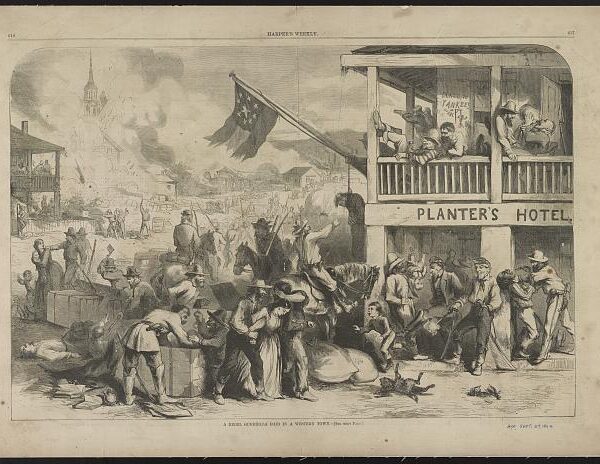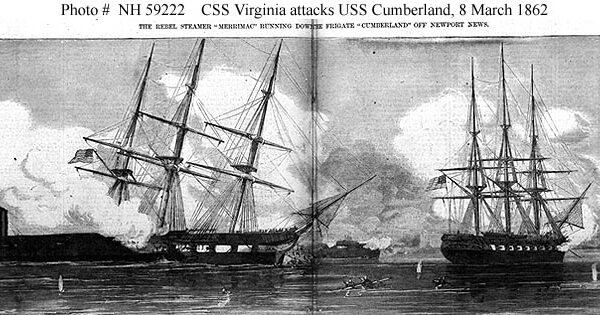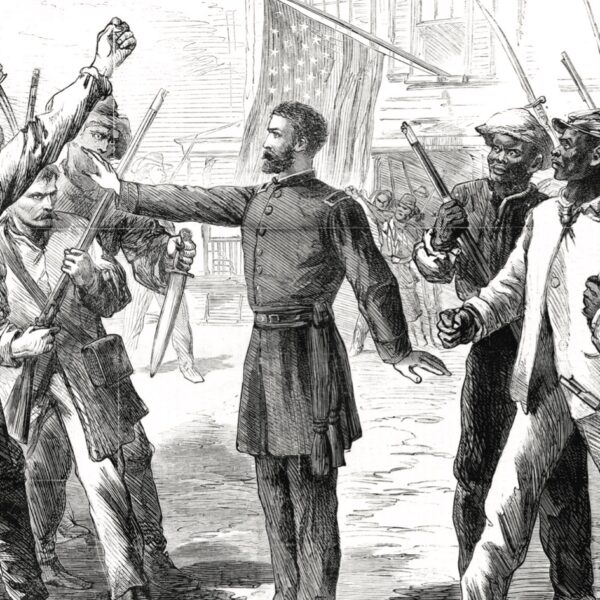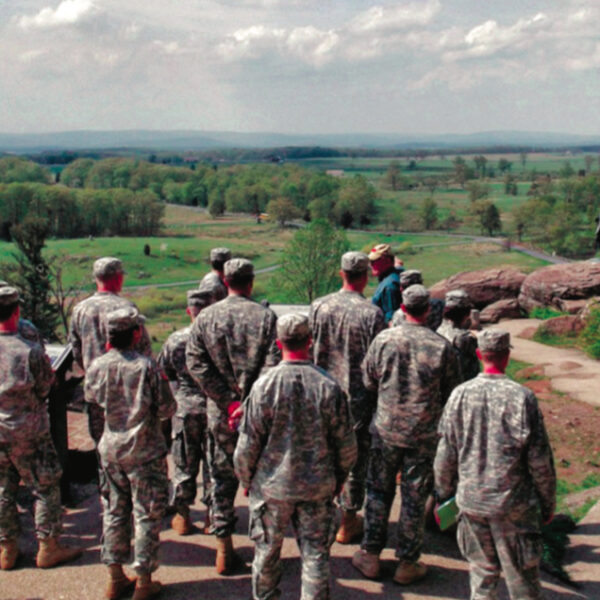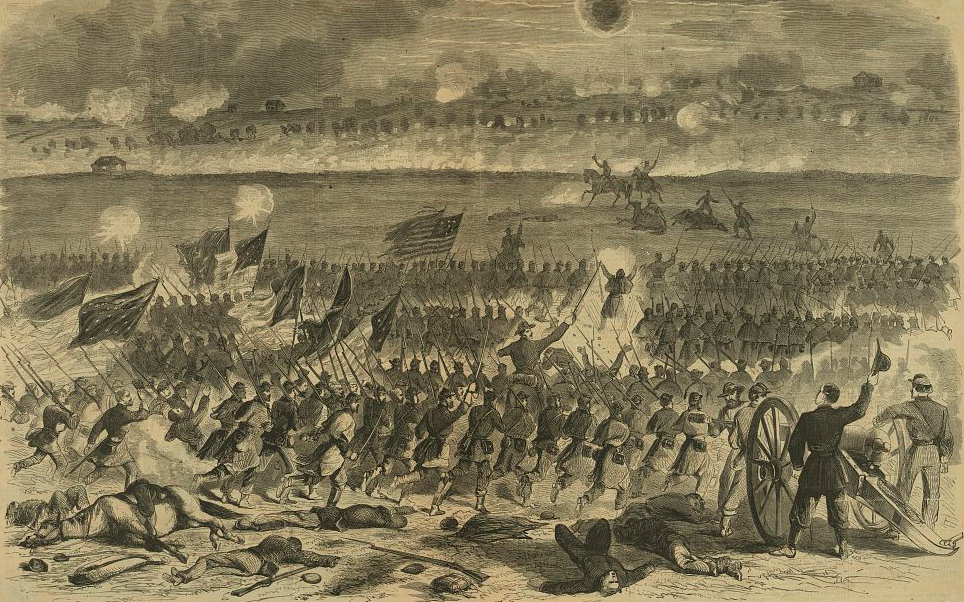
Alfred R. Waud’s depiction of the Battle of Fredericksburg
In the Voices department of our summer 2014 issue (Vol. 4, No. 2) we featured soldiers’ quotes that highlight some of the many—and diverse—sounds of war. Below are some additional examples that we could not run in the magazine, due to space limitations.
“I have read most glowing descriptions of battles, and my imagination has very often presented to me pictures so vivid that I thought they exceeded reality; but I am convinced that the terrible excitement and absorbing interest, the bursting shells and flying splinters, the enthusiasm and huzzas of the men, defy human power to describe. The man that says he felt no fear or trembling for the first few shots in an action, you may stamp as a coward.”
—Acting Master Walton Grinnell, U.S. steamer Nyack, October 11, 1861
“Old soldiers under self-control, become so accustomed to the hum of the rifle-ball as to disregard it altogether.”
—Union soldier Warren Hapgood Freeman in a letter to his parents, August 12, 1864
“You duck your head now as the balls whistle over. It is a nervous sound; but you would soon get over that here. They go with a hundred different sounds through the air, according to the shape, size, and velocity of the projectile. Two strike the bank. It is like two quick blows of a whip-lash. That went overhead, sharp as the cut of a cimeter; another goes with a long moan, then drops into the earth with a ‘thud.’ It comes from some more distant point, and is nearly spent. A shot comes from some great gun in the rear—an earthquake report; then the groaning, shuddering rush of the shell, as if the air were sick and tired of them, and it was too much to be borne that they should be so constantly sent.”
—James Kendall Hosmer, 52nd Massachusetts Infantry, during the siege of Port Hudson, Louisiana, June 25, 1863
“The previous roar of field artillery seemed as faint as the rattle of musketry, in comparison with these monsters of ordnance, that literally shook the water and strained the air.”
—Union surgeon Thomas T. Ellis, on the sound made by Union gunboats on the James River as they fired during the Peninsula Campaign, in his diary, June 1862
“On our way out we marched through some very heavy timber, where the sound of our tramping and the rattle of our bayonets aroused the many wood owls, and of all the hideous noises I ever listened to—it made my hair stand on end!”
—Iowa soldier Alexander G. Downing, in his diary, December 16, 1861
“Every morning the rattle of drums and peal of bugles sounded in every quarter, and every night brought the music of bands or the melodious sunset calls, while during the day the shouts of officers on drill, the rattle of artillery carriages in their evolutions, and the discordant sounds of the various bands and drum and bugle corps filled the air.”
—Union officer Thomas Leonard Livermore, in his memoirs
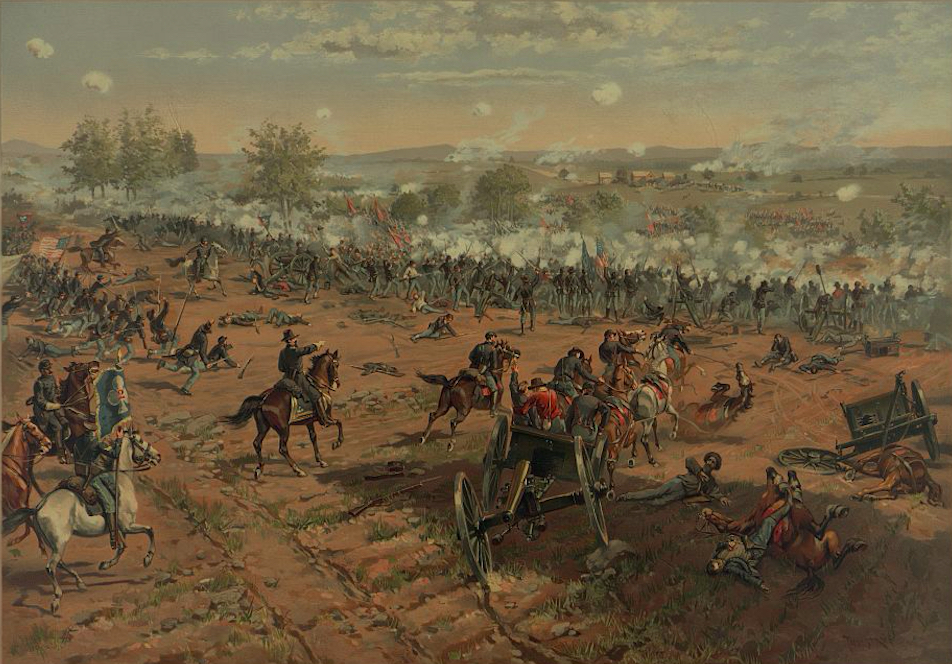
Pickett’s Charge
“The roar of the artillery, the rattle of the musketry and the wild terrific scream of the shells as they whizzed through the air was really the most appalling situation that could possibly be produced.”
—Confederate surgeon Spencer Glasgow Welch, relaying details of Pickett’s Charge in a letter to his wife, August 2, 1863
“You ought to hear those shells scream when they fly through the air. I feel certain I should bob my head if I heard one coming towards me. You have no idea what a fiendish noise they make. It is just like a locomotive going by one like a lightning flash, screaming with its shrillest whistle all the time.”
—Massachusetts officer Stephen Minot Weld, in a letter to his wife, February 18, 1862
“They would start at the report of the cannons and give a nice little city scream, as ladies will.”
—Pennsylvania volunteer Oliver Willcox Norton, on the local civilian women who came to camp to watch his regiment perform combat drills, December 19, 1861
“Oh the wild and mad huzzas which followed! Pen can not picture the scene. The four years of suffering, death and horrid war were over. Thank God! thank God!! was upon every tongue. Peace, home and friends were ours. Yes, thank God! What wonder that we were crazy with joy?”
—Union officer Luman Harris Tenney, on the scene in camp upon learning the news of General Robert E. Lee’s surrender, April 1865
Sources: Soldiers’ Letters, from Camp, Battle-field and Prison (1865); Letters from Two Brothers Serving in the War for the Union … (1871); The Color-Guard … (1864); Leaves from the Diary of an Army Surgeon (1863); Downing’s Civil War Diary (1916); Days and Events, 1860-1866 (1920); A Confederate Surgeon’s Letters to his Wife (1911); War Diary and Letters of Stephen Minot Weld (1912); Army Letters, 1861-1865 (1903); Luman Harris Tenney, War Diary, 1861-1865 (1914).

